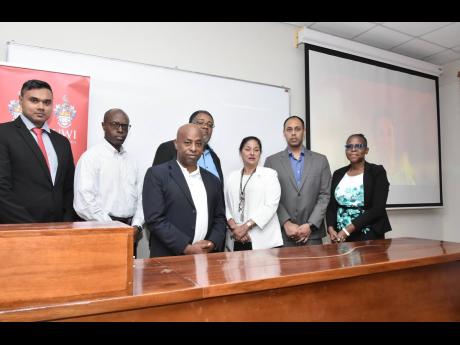UWI facilitating EV technologies training
WITH ELECTRIC vehicle (EV) technology rapidly emerging globally as the next generation technology in the transportation industry, The University of the West Indies (UWI), Mona has been ensuring that educators and students in the Caribbean are aware of the technological development and have the foundational knowledge to interact with it.
According to Professor Tannecia Stephenson, deputy dean, Faculty of Science and Technology at UWI, the Department of Physics, in consultation with the Caribbean Examinations Council office in Jamaica, considered the capacity development of teachers as a strategic direction that should be pursued.
The university is also partnering with the Caribbean Association of National Training Authorities (CANTA) and is currently exploring an approach to the development of some occupational standards and Caribbean Vocational Qualifications (CVQs) in electric mobility and to develop resources that would (primarily) enable Caribbean nationals to access in-person/online training, sit the relevant examinations and be awarded CVQs.
“We hope this approach will contribute to expanding the e-mobility workforce. We will also be facilitating additional workshops over the next two years, just to contribute to the capacity development efforts already under way in various Caribbean countries,” Professor Stephenson said.
“The UWI also has two EV courses that we are now offering and we have a growing partnership with TVETs (Technical and Vocational Education and Training) in the region to support each other’s efforts. We hope this suite of activities will help us contribute to the region’s readiness and even leadership in sustainable transportation,” she added.
Electric vehicles play a crucial role in promoting the integration of renewable energy sources into the transportation sector. By charging EVs with electricity generated from renewable sources, such as solar panels and wind turbines, we can maximise sustainability and reduce the carbon footprint of transportation. This integration also helps to stabilise the grid by utilising excess renewable energy during off-peak hours.
“The NDC-TEC is the programme through which UWI is currently receiving technical and financial support for roll out of the capacity developments effort. The NDC-TEC programme is funded by the German Federal Ministry for Economic Affairs and Climate Action via their International Climate Initiative and is in cooperation with the Deutsche Gesellschaft für Internationale Zusammenarbeit and continues to 2026,” Professor Stephenson said.
The programme, she said, is helping the university to facilitate engagement with CANTA and local TVETs, with some industry entities such as Tropical Mobility, ATL Automotive, Jamaica Urban Transit Company and Jamaica Public Service Company Limited, and some regional universities.
“We anticipate this partnership will allow us to leverage additional funding to expand our e-mobility training efforts. These include the development of undergraduate/postgraduate programmes in e-mobility, the development of professional development courses under the Mona Academy of Science and Technology and will help us facilitate even stronger partnerships with TVETs,” Professor Stephenson said.
She added that the objective is to expand the participation of tertiary level institutions in the transformations taking place in the transportation sector and contribute to research that identifies or maximises approaches most suited for the Caribbean.

